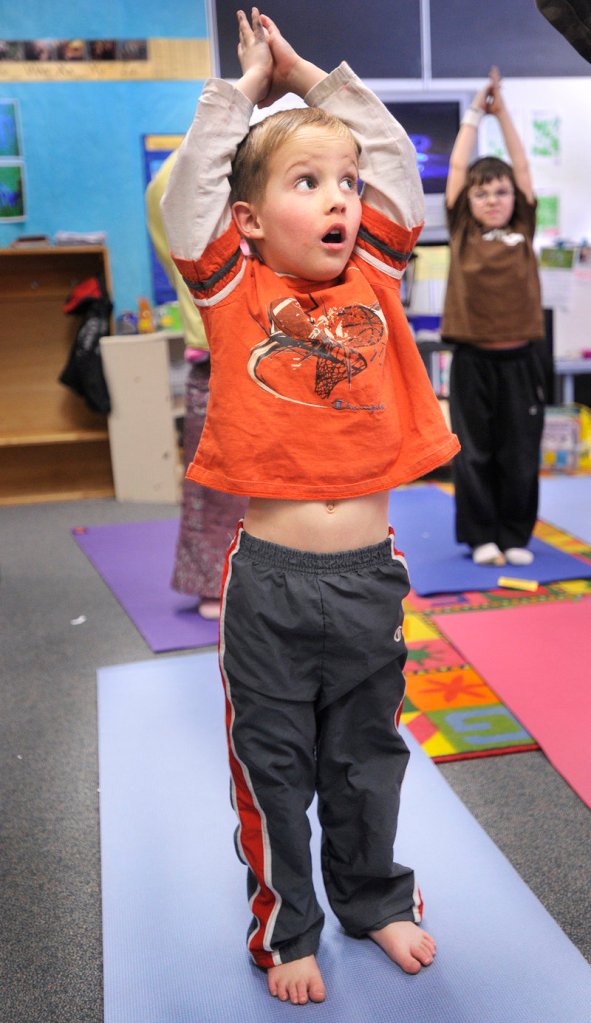PORTLAND – Darcy Lally, a third-grader at Riverton Elementary School, is creating a computer slide show featuring photographs of brightly colored tropical fish.
Fourth-grader Abdi Ali is designing a model of his dream house from a shoebox, complete with rooms for swimming, doing homework and keeping animals.
And Tyler Doss, a fifth-grader, is learning about his genealogy, mapping out recent ancestors on a hand-painted family tree.
“It was fun finding out who my great-great-grandparents were,” Tyler said, painting a steady black line on white paper. “I wanted to know who they were and what they did.”
Tyler and the other 420 students at Riverton are participating in a special six-week series of Friday afternoon workshops geared toward the children’s special interests.
Other topics covered in the hour-long “enrichment clusters,” held near the end of the school day, include cooking, birding, landscape design, photography, jewelry-making, dance, yoga, drama, folk tales, guitar-playing, puppetry, games from around the world, and the environment.
The enrichment workshops are part of Riverton’s effort to get off the list of 10 persistently lowest-performing schools in Maine that receive federal Title I funding for disadvantaged students. The school on outer Forest Avenue continually scored well below the state average on annual math and reading assessments during the three-year period targeted by federal education officials.
Identified last March, the 10 schools were eligible to apply for a share of $12 million in federal education reform funding that the Maine Department of Education received through the American Reinvestment and Recovery Act.
Riverton got a three-year, $3.4 million grant to implement an aggressive school improvement plan that includes intensive staff development and expanded student learning opportunities, most of which would be impossible within the school’s regular $1.1 million annual budget.
A year later, and seven months into the first year of Riverton’s improvement effort, teachers are seeing progress in the way they offer instruction and the way students learn.
“I think for many of us, it’s something you’ve always wanted to do but never had the resources or the time,” said Marydee Stinson, a first-grade teacher. “It is a lot of hard work, but the students are responding.”
So far, the improvement plan has focused on developing writing skills among students in kindergarten through fifth grade as a part of a more comprehensive and coordinated literacy program. The school tackled writing first because it is considered an essential component of achieving and demonstrating success in all areas of learning.
Teachers have attended numerous staff development sessions with a writing expert, who has met with groups of teachers during the school day, demonstrated best practices in the classroom and observed teachers practicing what they’ve learned.
Students who couldn’t write coherent sentences in September are now writing stories about personal experiences or letters persuading readers to see their side of an issue.
“We want students to develop a passion for becoming lifelong authors,” Stinson said. “We want them to know how to write with purpose for an authentic audience.”
In March, a technology coach will join Riverton’s staff to help teachers incorporate computer-assisted instruction in their classrooms.
The improvement plan also calls for providing additional staff development to help teachers work with multilingual students. Nearly half of Riverton’s students are learning to speak English.
The Friday afternoon enrichment workshops will conclude March 4 with a celebration presenting the projects that students have completed during the six-week program.
The workshops were developed to promote the idea that learning is fun and not limited to the classroom, said Principal Nancy Kopack. They also recognize that, in a school where 73 percent of students qualify for free or subsidized lunch, family resources for learning outside the classroom often are limited.
Before offering the workshops, Riverton’s staff surveyed students to learn about their interests, developed topics tailored to those interests and allowed students to sign up for the enrichment cluster of their choice, said Denise Sucher, a teacher of gifted students who helped to develop the enrichment program.
Students of all learning abilities have responded to the workshops, Kopack said. Many students, like Darcy Lally, describe them as their favorite part of the week. Some students who typically struggle in the classroom have found an opportunity to shine in the workshops.
“The traditional school day is teacher-led, so this was an opportunity to have students set their own learning goals based on their own interests,” Sucher said. “I believe all students have gifts and talents that we should tap into and enrich.”
The workshops cost little to offer, so they may be repeated next year, said Kate Theriault, school improvement grant coordinator.
Superintendent Jim Morse said he likes what he sees happening at Riverton and he anticipates that improvements being made there will be incorporated in other Portland schools.
“We do see Riverton as a model,” Morse said. “We know that the best practices are there and we know they are critical to successfully educating our youth.”
The teachers’ response to changes at Riverton has been mixed, Theriault said. In a survey taken in December, most teachers reported seeing improved student writing and greater student engagement in learning since September.
However, some teachers expressed concern about the rapid pace of change at the school. Some said they need more time to absorb recent professional development into their teaching practices. Others said they want change to happen more quickly.
For all of them, Theriault said, the goal is the same: to fundamentally improve the learning environment for all students at Riverton Elementary School. If Theriault and her colleagues are successful, improved test scores will follow.
“I think there is a moral imperative to get this done,” Theriault said. “When the $3.4 million is spent, we need to see a lasting impact.”
Staff Writer Kelley Bouchard can be contacted at 791-6328 or at:
kbouchard@pressherald.com
Copy the Story Link
Send questions/comments to the editors.





Success. Please wait for the page to reload. If the page does not reload within 5 seconds, please refresh the page.
Enter your email and password to access comments.
Hi, to comment on stories you must . This profile is in addition to your subscription and website login.
Already have a commenting profile? .
Invalid username/password.
Please check your email to confirm and complete your registration.
Only subscribers are eligible to post comments. Please subscribe or login first for digital access. Here’s why.
Use the form below to reset your password. When you've submitted your account email, we will send an email with a reset code.